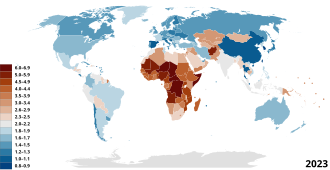Human overpopulation
Article about the concept of human overpopulation
Lua error in package.lua at line 80: module 'strict' not found.
Human overpopulation refers to a condition where the number of humans exceeds the carrying capacity of the Earth. This concept is often discussed in terms of the environmental, social, and economic impacts of a growing human population.
Overview
Human overpopulation is a complex issue that involves the interplay of various factors such as fertility rate, mortality rate, and migration. The United Nations has projected that the global population could reach 9.7 billion by 2050, which raises concerns about the sustainability of resources and the environment.
Historical Context
The concept of overpopulation has been a topic of concern since the publication of Thomas Malthus's "An Essay on the Principle of Population" in 1798. Malthus argued that population growth would outpace agricultural production, leading to widespread famine and poverty. While technological advancements have delayed such outcomes, the rapid increase in population continues to pose significant challenges.
Causes
Several factors contribute to human overpopulation:
- High Birth Rates: In many developing countries, high birth rates contribute significantly to population growth. Cultural, religious, and economic factors often encourage large families.
- Decreased Mortality Rates: Advances in medicine and public health have significantly reduced mortality rates, leading to longer life expectancies and increased population.
- Migration: Migration can lead to overpopulation in certain areas, especially urban centers, as people move in search of better opportunities.
Impacts
The impacts of human overpopulation are wide-ranging and include:
- Environmental Degradation: Overpopulation leads to increased demand for resources, resulting in deforestation, loss of biodiversity, and pollution.
- Economic Strain: High population density can strain infrastructure, healthcare, and education systems, leading to economic challenges.
- Social Issues: Overpopulation can exacerbate social issues such as poverty, unemployment, and inadequate housing.
Solutions
Addressing human overpopulation requires a multifaceted approach:
- Family Planning: Promoting family planning and access to contraceptives can help control birth rates.
- Education: Educating women and girls is one of the most effective ways to reduce fertility rates and improve economic outcomes.
- Sustainable Development: Implementing sustainable development practices can help balance population growth with resource availability.
Also see
- Carrying capacity
- Demographic transition
- Sustainable development
- Population density
- Environmental impact of agriculture
References
External links
Transform your life with W8MD's budget GLP-1 injections from $125.
W8MD offers a medical weight loss program to lose weight in Philadelphia. Our physician-supervised medical weight loss provides:
- Most insurances accepted or discounted self-pay rates. We will obtain insurance prior authorizations if needed.
- Generic GLP1 weight loss injections from $125 for the starting dose.
- Also offer prescription weight loss medications including Phentermine, Qsymia, Diethylpropion, Contrave etc.
NYC weight loss doctor appointments
Start your NYC weight loss journey today at our NYC medical weight loss and Philadelphia medical weight loss clinics.
- Call 718-946-5500 to lose weight in NYC or for medical weight loss in Philadelphia 215-676-2334.
- Tags:NYC medical weight loss, Philadelphia lose weight Zepbound NYC, Budget GLP1 weight loss injections, Wegovy Philadelphia, Wegovy NYC, Philadelphia medical weight loss, Brookly weight loss and Wegovy NYC
|
WikiMD's Wellness Encyclopedia |
| Let Food Be Thy Medicine Medicine Thy Food - Hippocrates |
Medical Disclaimer: WikiMD is not a substitute for professional medical advice. The information on WikiMD is provided as an information resource only, may be incorrect, outdated or misleading, and is not to be used or relied on for any diagnostic or treatment purposes. Please consult your health care provider before making any healthcare decisions or for guidance about a specific medical condition. WikiMD expressly disclaims responsibility, and shall have no liability, for any damages, loss, injury, or liability whatsoever suffered as a result of your reliance on the information contained in this site. By visiting this site you agree to the foregoing terms and conditions, which may from time to time be changed or supplemented by WikiMD. If you do not agree to the foregoing terms and conditions, you should not enter or use this site. See full disclaimer.
Credits:Most images are courtesy of Wikimedia commons, and templates, categories Wikipedia, licensed under CC BY SA or similar.
Contributors: Prab R. Tumpati, MD


